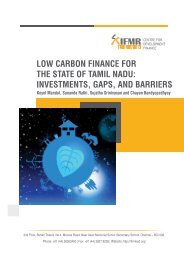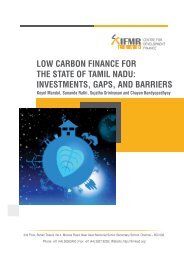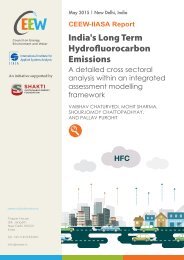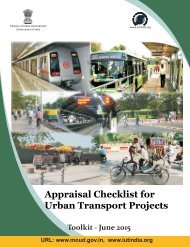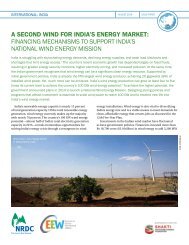Enhancing India’s Readiness to Climate Finance
India has taken several steps to improve its national response to climate change. India’s climate finance requirements, however, are very high, and will need to be met through a combination of public, private and international climate finance. See more at: http://shaktifoundation.in/
India has taken several steps to improve its national response to climate change. India’s climate finance requirements, however, are very high, and will need to be met through a combination of public, private and international climate finance. See more at: http://shaktifoundation.in/
- No tags were found...
Create successful ePaper yourself
Turn your PDF publications into a flip-book with our unique Google optimized e-Paper software.
<strong>Enhancing</strong> <strong>India’s</strong> readiness <strong>to</strong> access and deliver international climate finance<br />
emission trading scheme pilots. While India has attempted <strong>to</strong> implement similar initiatives, they have<br />
suffered from weak uptake and lower compliance – mainly due <strong>to</strong> a lower level of engagement with the<br />
private sec<strong>to</strong>r when designing these schemes than in China.<br />
4. <strong>Readiness</strong> Gap: DFIs in India have limited capacity <strong>to</strong> implement climate-related projects<br />
beyond a narrow range of themes, sec<strong>to</strong>rs, and geographies. India therefore faces<br />
challenges in developing a pipeline of bankable projects, which could help remove barriers<br />
for project financers and increase climate-related investment in the country.<br />
Recommendation #4:<br />
India should strengthen the capacity of DFIs <strong>to</strong> design, select, coordinate and fund national and<br />
state-level climate change projects and programmes, in order <strong>to</strong> increase the coverage of<br />
climate-related activities and <strong>to</strong> develop bankable projects <strong>to</strong> attract further investment.<br />
Actions:<br />
Provide DFIs with formal mandates <strong>to</strong> allocate funds for climate-related activities under the<br />
NAPCC and SAPCCs<br />
Create new DFIs <strong>to</strong> promote low carbon development actions in carbon-intensive sec<strong>to</strong>rs<br />
e.g. transport, energy intensive industries, forestry, waste, and water management.<br />
Create a climate finance group within each DFIs with a clear mandate <strong>to</strong> develop<br />
investment criteria <strong>to</strong> deploy climate finance.<br />
Promote greater collaboration between DFIs, research institutions and the private sec<strong>to</strong>r <strong>to</strong><br />
develop bankable projects.<br />
Explore how other financial institutions like State Bank of India (SBI), Infrastructure<br />
Development <strong>Finance</strong> Company (IDFC), Infrastructure Leasing & Financial Services<br />
Limited (IL&FS), etc. can also allocate climate finance<br />
Design capacity building programmes at the sub-national level <strong>to</strong> assist DFIs, national<br />
banks, project developers, local government, etc. in developing bankable projects.<br />
Apply for GCF <strong>Readiness</strong> support for DFIs <strong>to</strong> improve climate finance access and delivery.<br />
Experience from China shows that focusing on capacity building at sub-national levels can help<br />
improve project development, design, and implementation that are the necessary first steps <strong>to</strong><br />
developing a pipeline of bankable projects. The Chinese CDM Fund provides capacity building and<br />
training for the private sec<strong>to</strong>r, which has helped <strong>to</strong> remove market and technical barriers for project<br />
developers <strong>to</strong> design good quality projects.<br />
In Mexico, the central role of DFIs in delivering the national climate change strategy has led <strong>to</strong> the<br />
development of programmes and projects across a broader range of sec<strong>to</strong>rs, themes and regions.<br />
This has led <strong>to</strong> increased investment by the private sec<strong>to</strong>r in climate-related projects.<br />
The GCF has received requests from fourteen countries 7 for readiness support and has already<br />
started <strong>to</strong> review them. Requests range from support <strong>to</strong> create strategic frameworks for engagement<br />
with the fund, programme and pipeline development, identification of implementation arrangements as<br />
well as requirements for accreditation of national implementing entities.<br />
7 Antigua and Barbuda, Belize, Cook Islands, Dominica, Eritrea, Ethiopia, Indonesia, Mali, Mauritius,<br />
Mongolia,<br />
Namibia, Palau, São Tomé and Príncipe, Rwanda (Source: Green <strong>Climate</strong> Fund. <strong>Readiness</strong> and<br />
Prepara<strong>to</strong>ry Support Programme Update July 2014 -<br />
http://www.gcfund.org/fileadmin/00_cus<strong>to</strong>mer/documents/<strong>Readiness</strong>/<strong>Readiness</strong>_Newsletter_July_2014_FI<br />
NAL.pdf)<br />
Ref: Ricardo-AEA/R/ED59216/Final Report<br />
xiii




